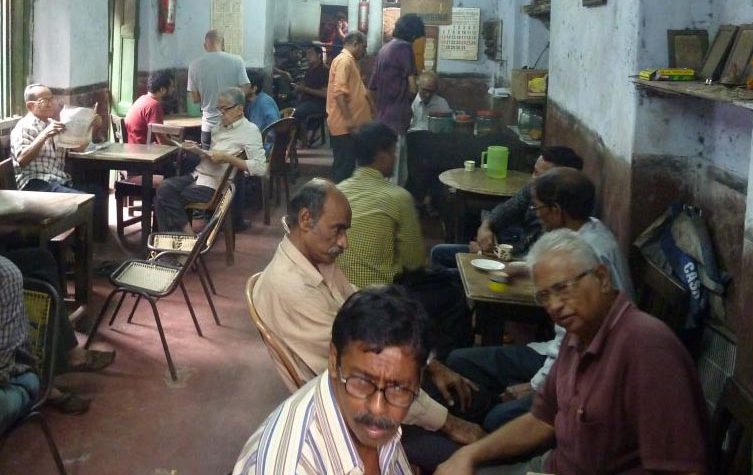Biting into a crunchy piece of warm buttered toast along with sips from a steaming hot cup of tea sitting on a rickety wooden chair at this place, it may not have struck you that this could be the same chair where poet Kazi Nazrul Islam sat and ate breakfast nearly 80 years back.
Look around. Did it occur to you that a round white marble-top table here may have been used by Netaji Subhas Chandra Bose to work out the blueprint of a plan to free the country from British rule?
In a city where multistoried buildings are replacing century-old aristocratic mansions of both north and south Kolkata, Favourite Cabin on College Street has stood the test of time. Not only that, the owners are trying to meticulously preserve the décor of many decades ago, consciously keeping itself out of the race to match the kitschy or the cool of swanky new cafés.
Octogenarian Badal Barua, co-owner of Favourite Cabin says proudly, “Our décor reflects the nostalgia of our glorious bygone days. So we have changed only those things that got damaged over a period of time. Everything else remains unchanged since inception.”
Some new inclusions were plastic chairs. Barua regrets it though “Plastic chairs are no match for the old wooden chairs on a lawn that are here since 1918. But we had to add some since wooden furniture is very expensive,” he says.
An enormous coal furnace, a tin tray to toast the bread – are also torch-bearers of the cabin’s century old tradition. Barua says, “These are not for display. We still toast breads in the coal-furnace because it brings a special taste. We could have gone for cheaper LPG cylinders, but our customers wouldn’t approve of it.”
Sitting under a creaking DC fan, regular customer, Rathin Biswas, agrees, “I come to Favourite Cabin to soak in the tradition and nostalgia. If that changes, the place will lose its charm.”
During first half of the 20th century, Nutan Chandra Barua and his elder brother Gaur Chandra Barua, who hailed from Bangladesh’s Chittagaong, set up Favourite Cabin in 1918 on 69B Surya Sen Street (then known as Mirzapur Street). The amiable and warm hearted reception of the owners made it a favourite haunt of people from every group – college students to freedom fighters.
Over the years the place may have fallen silent in comparison, but the memories of the many heated, intellectual debates on political ideology, fascinating and whimsical conversations, remain. Dilip Barua says, “We’ve never asked customers to leave, even after they finish their tea or food. They can spend hours on end and continue with their adda.”
Favourite Cabin has been a favourite destination for freedom fighters, prolific authors – all of whom were instrumental in shaping the future of India. Kazi Nazrul Islam used to acquire a table by the side of the window, sit there quietly for hours, words flowing from his pen. Subhas Chandra Bose was a regular who often listened intently to the poet.
Favourite Cabin wasn’t under major suspicion of the British police, and thus a safe place for the freedom fighters to work out their plans.
Dilip Barua (87), co-owner, remembers, “Earlier, our cabin was divided into three parts – an outer area, followed by the inner chamber where all the plans and discussions on the freedom movement used to held, and then there was the kitchen. The cash counter was supervised by my father or uncle. If they sensed a police raid, they would tap a spoon on a plate to alert the revolutionaries.”
He shows a small door by the kitchen, and adds – his eyes sparkling with child-like excitement, “The revolutionaries would escape through the door and police had to return empty-handed.”
The thick, colossal walls of Favourite Cabin have witnessed India’s struggle for freedom, seen the birth of several political ideals, gone through the transition period during Independence, followed by fierce rivalry among political parties, and the stormy days of Naxal movement.
Retired teacher, Tapan Basu (78), says, “I tried to sit as close as possible to those great leaders, so I could eavesdrop”. Since then he makes sure to have a cup of tea every day at Favourite Cabin.
Poet Sunil Gangopadhay was also a regular. Dilip Barua recalled, “During the Seventies, due to a hike in sugar price, we placed a notice to increase the price of tea from 25 paisa to 30 paisa and Sunilbabu protested it through a newspaper column.” Actor Soumitra Chatterjee was also a Favourite visitor.
The menu here has remained almost the same over the years – tea, lemon tea, pan cake, slice cake. The price of the tea and toast makes it a popular destination still. Badal Barua says, “he cheap rate and scope for unbridled adda here prove our superiority over those even among the younger generation.” Samadrita Banerjee, a student of Calcutta University echoed this, “The main attraction here are the long adda sessions without pinching the pocket.” Shashwata Ganguly, a former student of Presidency University currently studying in Germany said, “I was bowled over by the marble top tables. It evoked a sense of ancient Bengal within the heart of Kolkata.”
Eighty-seven year old Dilip Barua continues to prepare tea and toast even today with great enthusiasm and love. The charming old Favourite Cabin has witnessed awakening, rise and fall of many generations and ideologies. And every sip of tea, every bite of the toast here is filled with memories, nostalgia and the essence of Kolkata.
On its centenary year, Favourite Cabin hopes to serve for hundreds of years to come.

